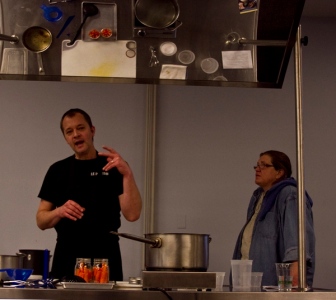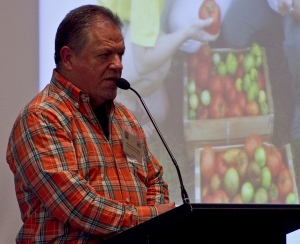3 Sisters Garden
Amid The Re:Nuisánce
St. Patrick’s Day in Chicagoland was the warmest in 141 years. This is the first time that I’ve ever seen spring come early and we saw record breaking highs for a stretch of 8 consecutive days. While the rest of the city was feverishly binge-drinking, killing little girls and chanting USA at guy-on-guy action in Arlington Heights, we found a peaceful place to be. We were at the front lines of the Slow Food movement, among the sensible people that gathered to share information at The Good Food Chicago Conference. We aren’t chefs or farmers but there are parallels between our struggle as creative individuals and this food rebel cause.
Paul Virant, chef of Vie Restaurant, took a poll of the farmers and foodies present during a panel on Canning and Preserving. “How many of you are excited about the weather?” About 20% threw their hands in the air. “How many are scared?” The other 80% looked at one another as they slowly raised their hands. “How many think the Mayans were right?” One lady blushed when she realized that she was the only one with her hand up. One thing that everyone agreed on was that they still wouldn’t plant their crops yet.
One thing that everyone agreed on was that they still wouldn’t plant their crops yet.
Paul was joined by half of the workforce at 3 Sisters Gardens. Tracey Vowell worked for Rick Bayless at Frontera Grill before starting the indoor farm near Kankakee, IL with her partner, Kathe Roybal. She was part of the workshop to emphasize the close-knit relationship between some restaurants and farmers in Chicago. Their collaborative spirit was demonstrated when Paul mentioned writing her products into a recipe that would be published in a magazine. “They called me for an order last week, thank you.” Tracey responded.
Tracey and Kathe specialize in growing Corn, Beans and Squash because of the Native American tradition of growing the 3 veggies in a single mound. Her advice to those interested in agribusiness could easily apply to the arts or filmmaking. “Don’t grow what everyone else is growing. Find your own market.” She said that consistently growing corn, beans and squash, along with microgreens, means that farmers from all around Midwest count on her to supplement their CSA (Community Supported Agriculture.) This allows her to collaborate and bridge markets with fellow farmers instead of competing against them.
Michael O’Gorman, who now helps veterans start food businesses, spoke as part of a panel called So You Wanna Be a Farmer. He started farming during The Back to the Land Movement in the 1970s and explains that everyone was growing their own food in the wake of the Vietnam War. Many even made a living in farming until droughts in the late 1980s put 1 out of every 100 farmers out of business. He told this story to make sure that anyone considering a life on the farm knows that “if you don’t have PTSD before becoming a farmer, give it a few years.”
Many even made a living in farming until droughts in the late 1980s put 1 out of every 100 farmers out of business. He told this story to make sure that anyone considering a life on the farm knows that “if you don’t have PTSD before becoming a farmer, give it a few years.”
O’Gorman’s longview of the food movement is reassuring. He encourages prospective farmers to think about their farm like a work of art or a movie. “What kind of movie do you want to make?” The leaders of the food movement are looking to us, the artsy fartsies, as inspiration for their work. My short documentaries stand as an alternative to John Carter, just like 3 Sisters Gardens stands as an alternative to Monsanto and other titans of industrialized farming.
“It’s not about markets, it’s not about your land. It’s about the knowledge.” – Michael O’Gorman
This cross-pollination or Re:Mix of ideas from farmers to chefs to filmmakers to artists all shares a single spirit. We’re all fighting our own Goliaths. Whether it’s Monsanto, McDonald’s, TMZ or Ads and Billboards, we’re all fighting against a flood of mass-produced distractions that keep people from taking time to appreciate real food, independent film and contemporary art. A shift has been in the mix for some time. Real, substantial change seems to be at our fingertips and on the tips of our tongues.
I propose that we are already in the throws of a Second-Hand Renaissance made up of shared ideas about our surroundings; corrupt, big-brother, tabloid journalism; Bloated-Budget, Bombing Blockbusters; RT, TL;DR, HD-TV News and Slick, Sugar-Coated Marketing that keeps us running to the store in fear. In this overbearing environment, filled with feedback and LCD screens, those of us that can re-appropriate the mess that engulfs us are amid a new Artistic Revolution. A Re:Nuisánce.
On the other side of the country, around the same time as the So You Wanna Be a Farmer panel, Bruce Springsteen delivered the keynote address at the SXSW Festival in Austin, TX that echoed the sentiment of the Good Food Movement. He spoke of revolution, rebellion and bringing a working-class mentality to our creativity. Not back to the land, but back to the soul. Back to the root of the problem. He talks about the pride and humility required to succeed in music, or any other field and reminds us that “if it doesn’t drive you crazy, it will make you strong.”
Like O’Gorman, The Boss puts our current struggle in the context of his experience with the evolution of rock and roll. They both make it clear that, while we’re on the ground floor of a brand new way of living, working and collaborating, we stand on the shoulders of people that have been there before and made it work. The torch has been passed. Maybe the Mayans were right.